86 years ago today, a pair of remarkable treasures were uncovered in the palace called Apadana, in the ruins of the Persian capital of Persepolis. Large gold and silver plaques bearing trilingual inscriptions were found secured inside boxes under the foundations of the building. They contained an inscription by Darius in Old Persian cuneiform, as well as two other languages, which describe the extent of his Empire in broad geographical terms. READ what they tell us… (1938)

“Darius the great king, king of kings, king of countries, son of Hystaspes, an Achaemenid. King Darius says: This is the kingdom which I hold, from the Sacae who are beyond Sogdia, to Kush, and from Sind to Lydia – [this is] what Ahuramazda, the greatest of gods, bestowed upon me. May Ahuramazda protect me and my royal house!”
For those unfamiliar with these ancient place names, Darius I describes an empire that stretches eastward, from the Indus Valley, modern-day Pakistan, to parts of Central Asia, today encompassing as far east as Tajikistan and as far north as Kazakhstan; and westward as far as the boundary of the state of Lydia on the Bosporus, modern-day Turkey.
MORE Good News on this Day:
- English writer Daniel Defoe (Robinson Crusoe) was placed in a pillory as punishment for writing a satire, but instead of humiliation in the public square, Defoe met sympathy from Londoners who threw flowers instead of vegetables or stones, and drank to his health (1703)
- Marquis de Lafayette, a 19-year-old French nobleman, was bestowed by the US Congress with the rank and commission of major-general of the United States, “in consideration of his zeal, illustrious family, and connections” (1777)
- A total ban on the use of landmines was announced by the British government, after significant public pressure to endorse an international landmines treaty (1998)
- The presence of the British Army in Northern Ireland, the longest-running British Army operation ever, came to an end (2007)
- At the end of his European tour, Bruce Springsteen played his longest show to date – 4 hours and 6 minutes (2012)
- American swimmer Michael Phelps broke a record held for 48 years by Russian gymnast, Larisa Latynina, when he won his 19th Olympic medal, the most by any athlete in history (2012)
131 years ago today, Conradh na Gaeilge, or the Gaelic League, was founded in Dublin, Ireland as an association to support the Irish language and encourage the citizens of the island to take a greater interest in their culture. Two years before its establishment by Douglas Hyde and Eoin MacNeill, childhood education of Irish had plummeted from 45% in the mid-19th century to just 3.5% during its final decade.
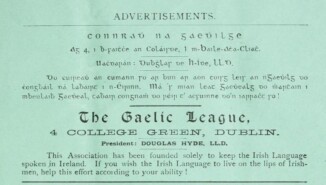
The first aim of the League was to maintain the language in the Gaeltacht, the largely western districts in which spoken Irish survived. The late 20th-century Gaeilgeoir activist Aodán Mac Póilin notes, however, that “the main ideological impact of the language movement was not in the Gaeltacht, but among English-speaking nationalists”.
With the aid of Eugene O’Growney (author Simple Lessons in Irish) Eoin MacNeill, Thomas O’Neill Russell, and others, the League was launched in the wake of an address Hyde delivered to the Irish National Literary Society, on 25 November 1892 when he said “in Anglicising ourselves wholesale we have thrown away with a light heart the best claim we have to nationality.”
Among the League’s few campaign successes in its first decade was acceptance by the Post Office of parcels and letters addressed in Irish, and the recognition of St. Patrick’s Day as a national holiday. By 1904, Irish was introduced in school curriculums.
The League encouraged female participation from the start and women filled prominent roles. Local notables, such as Lady Gregory in Galway, Lady Esmonde in County Wexford, and Mary Spring Rice in County Limerick, and others such as Máire Ní Shúilleabháin and Norma Borthwick, founded and led branches.
Gaelic League successfully campaigned for the enactment of the Official Languages Act in 2003 which gave greater statutory protection to Irish speakers and created the position of An Coimisinéir Teanga (The Languages Commissioner). Conradh na Gaeilge was among the principal organizations responsible for coordinating the successful campaign to make Irish an official language of the European Union. (1893)
34 years ago today, U.S. President George H.W. Bush and Soviet leader Mikhail Gorbachev signed the historic Strategic Arms Reduction Treaty, known as START. It reduced the countries’ stockpiles of nuclear warheads by about one-third, following a long period of mistrust and animosity, known as the Cold War years. (1991)
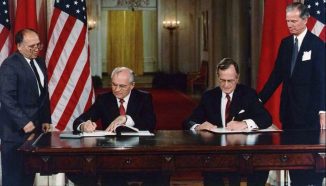
On this day in 1957, Richard Starkey (later known as Ringo Starr) made his debut at The Cavern in Liverpool, playing drums with the Eddie Clayton Skiffle Group. John Lennon first appeared at the club a week later with The Quarry Men. Three and a half years later, Brian Epstein, who would become their manager, first saw The Beatles performing in this warehouse basement. The Fab Four went on to play 292 times in the underground pub, which was formerly a bomb shelter, but now is the most famous nightclub in the world.
RELATED: Ringo Sells Beatles Drum Kit, Other Treasures, Raises $9.2M for Charity
Happy 59th Birthday to J.K. Rowling, the author and humanitarian who, before writing the first of seven books in the Harry Potter series, was a single mom supported by welfare—but she transformed herself into the world’s first female billionaire novelist.
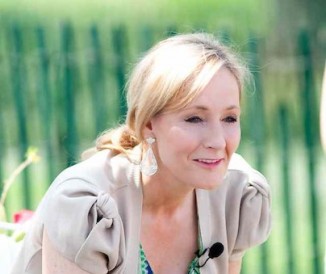
During the 2020 lockdown, Rowland dusted off a fairytale she’d created years earlier to read aloud for her little kids—chapter by chapter as she’d finish them. Entitled The Ickabog, it was offered the same way to children in quarantine—with each chapter released one at a time for free on her website. In November, the book was published in English (recommended for ages 7-9) and Rowling pledged all author royalties from The Ickabog to COVID-19 charities. The illustrations were even chosen from kids’ artwork submitted during lockdown.
Her artful wizarding fantasies became the best-selling book series in history, translated into 73 languages, but she’s not on the Forbes’ Billionaires list anymore because she gives so much to charity—particularly to multiple sclerosis, illiteracy, and child welfare charities—but also to the ‘tax man’, as a form of patriotism. She said, “I am indebted to the British welfare state… When my life hit rock bottom, that safety net, threadbare though it had become… was there to break the fall.” LISTEN to chapter one and learn more… (1965)
238 years ago today, Poems, Chiefly in the Scottish Dialect by Robert Burns, the National Poet of Scotland, was published in Kilmarnock. It was a hit, and catapulted him to Scottish Stardom. Among the collection is one of his two most famous poems, To a Mouse, which is actually called To a Mouse, on turning up her nest, with the plough, November. Of Burns’ reputation as the “ploughman poet” who writes about rural life, this title is typical, but not as dramatic as The auld Farmer’s new-year-morning Salutation, to his auld Mare, Maggy, on giving her the accustomed ripp of Corn to hansel in the new year.
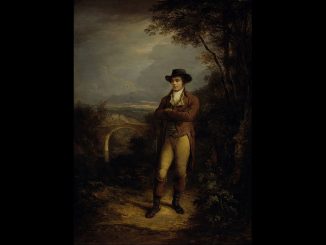
To a Mouse includes the famous line “The best laid plans of mice and men oft go awry.” In the poem about Maggy the mare, he opens in his classic rhyming pattern, this one in Scotts:
A Guid New-year I wish thee, Maggie!
Hae, there’s a ripp to thy auld baggie:
Tho’ thou’s howe-backit now, an’ knaggie,
I’ve seen the day
Thou could hae gaen like ony staggie,
Out-owre the lay.
Other poems include To a Louse, proving there is no “beastie” so insignificant as to escape the observations of the ploughman poet.
In it, he notes a louse crawling on a lady’s bonnet in church, and at first, chastises the insect for its misconduct, but then realizes that to a louse, all humans must seem the same, and that if only human and louse could see each other through each other’s eyes, they would understand one another. An alternative interpretation is that the poet is musing to himself how horrified and humbled the pious woman would be if she were aware she was harboring a common parasite in her hair.
Oh, would some Power give us the gift
To see ourselves as others see us!
It would from many a blunder free us,
And foolish notion:
What airs in dress and gait would leave us,
And even devotion! (1786)
Also, Happy 80th Birthday to Sherry Lansing, who was named the president of 20th Century Fox in 1980 and became the first woman to head a Hollywood movie studio.

A former math teacher, model, and actress, she was dissatisfied with her own acting skills, so decided to learn about the film industry. She started her own production company that created the box-office smash Fatal Attraction in 1987, for which she won a Best Picture Oscar nomination. (1944)
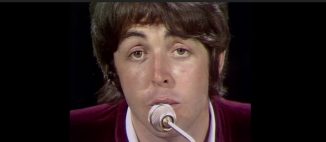
Also on this day in 1968, The Beatles recorded the master track of a new Paul McCartney song ‘Hey Jude’. McCartney wrote the song originally as ‘Hey Jules’, to comfort John Lennon’s son, Julian, during his parents’ divorce. Working at Trident studios in London where they could access 8-track equipment, it became the first single for their new Apple Records—and more than seven minutes in length, Hey Jude spent nine weeks at number one on the U.S. charts, the longest for any Beatles single.
During the coda, which lasts for more than four minutes, they added a 36-piece orchestra—and not a particularly enthusiastic one. There was dissension among the classically-trained musicians, some of whom “were looking down their noses at the Beatles”. To bolster the energy and passion in their performance, McCartney finally stood up on the grand piano and began conducting them from there. On another take, the Beatles then asked the orchestra members if they would clap their hands and sing along during the fading refrain. All but one of the musicians complied (for a double fee). The one abstainer reportedly said, “I’m not going to clap my hands and sing Paul McCartney’s bloody song!”
The Beatles recorded the following promotional film, after the hit had been on sale in America for a week, enlisting an audience of around 300 local people, and grabbing fans outside Abbey Road Studios, to perform during the song’s finale. WATCH the video below, which was broadcast in the US on The Smothers Brothers Comedy Hour.
SHARE The Milestones, Memories, and Music…



















